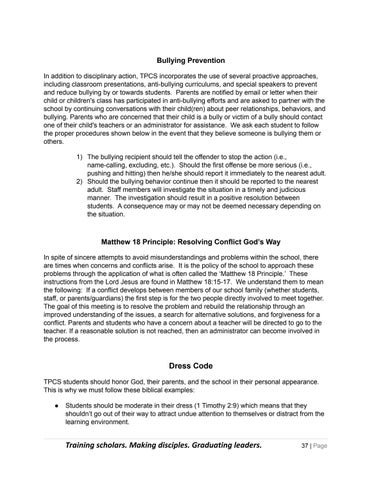Bullying Prevention In addition to disciplinary action, TPCS incorporates the use of several proactive approaches, including classroom presentations, anti-bullying curriculums, and special speakers to prevent and reduce bullying by or towards students. Parents are notified by email or letter when their child or children's class has participated in anti-bullying efforts and are asked to partner with the school by continuing conversations with their child(ren) about peer relationships, behaviors, and bullying. Parents who are concerned that their child is a bully or victim of a bully should contact one of their child's teachers or an administrator for assistance. We ask each student to follow the proper procedures shown below in the event that they believe someone is bullying them or others. 1) The bullying recipient should tell the offender to stop the action (i.e., name-calling, excluding, etc.). Should the first offense be more serious (i.e., pushing and hitting) then he/she should report it immediately to the nearest adult. 2) Should the bullying behavior continue then it should be reported to the nearest adult. Staff members will investigate the situation in a timely and judicious manner. The investigation should result in a positive resolution between students. A consequence may or may not be deemed necessary depending on the situation.
Matthew 18 Principle: Resolving Conflict God’s Way In spite of sincere attempts to avoid misunderstandings and problems within the school, there are times when concerns and conflicts arise. It is the policy of the school to approach these problems through the application of what is often called the ‘Matthew 18 Principle.’ These instructions from the Lord Jesus are found in Matthew 18:15-17. We understand them to mean the following: If a conflict develops between members of our school family (whether students, staff, or parents/guardians) the first step is for the two people directly involved to meet together. The goal of this meeting is to resolve the problem and rebuild the relationship through an improved understanding of the issues, a search for alternative solutions, and forgiveness for a conflict. Parents and students who have a concern about a teacher will be directed to go to the teacher. If a reasonable solution is not reached, then an administrator can become involved in the process.
Dress Code TPCS students should honor God, their parents, and the school in their personal appearance. This is why we must follow these biblical examples: ●
Students should be moderate in their dress (1 Timothy 2:9) which means that they shouldn’t go out of their way to attract undue attention to themselves or distract from the learning environment.
Training scholars. Making disciples. Graduating leaders.
37 | Page

